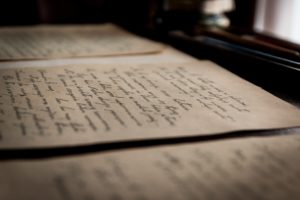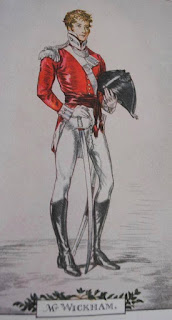The recent discovery of George Wickham’s papers in circumstances as dramatic as any novel should rightly have been a cause célèbre. Perhaps mindful of the appropriation of the gentleman’s name and likeness by other authors over the years, however, the Wickham estate chose not to publicise this important discovery.
The Mr Wickham that emerges from these pages is a man of no small confidence who was, it seems, blessed by fortune even as he faced privations, hardship and danger. His memoirs are those of a life well-lived but not of a life without challenges and can be read at Austen Variations; I do hope you enjoy them.
If you'd prefer to meet the gentleman himself, he is fielding questions on all manner of matters over at Just Jane 1813. Thank heavens for Regency-era broadband!
You can read part 1 below...

If you'd prefer to meet the gentleman himself, he is fielding questions on all manner of matters over at Just Jane 1813. Thank heavens for Regency-era broadband!
You can read part 1 below...
The recent discovery of George Wickham’s papers in circumstances as dramatic as any novel should rightly have been a cause célèbre. Perhaps mindful of the appropriation of the gentleman’s name and likeness by other authors over the years, however, the Wickham estate chose not to publicise this important discovery.
It has been my honour and privilege to be appointed by the estate to put the Wickham papers into some semblance of order. Though familiar to historians of the 18th and 19th century for his exploits in society, his endeavours on the battlefield and his occasionally startlingly informal efforts to further the cause of British diplomacy, Mr Wickham has remained a divisive figure. Highly decorated both at home and overseas, he chose to eschew his many glittering titles and continued to use the humble suffix, “Mister”, though the gentleman that emerges from his papers is far from unassuming.
On his death, Mr Wickham left not only his memoirs, written in his own distinctive voice, but a treasure trove of letters, papers and diaries. In presenting these to you, I have made very few editorial changes, preferring to let George Wickham’s voice tell his own story. You will see my hand only where necessary in footnotes to clarify facts or further elaborate on incidences where Mr Wickham’s exuberant manner has led him to assume the reader is in possession of knowledge that a 21st century audience might not have. Likewise, Mr Wickham peppered his manuscript with notes to his own prospective editor and these have been left intact and italicised, allowing his informal voice to be heard.
The Mr Wickham that emerges from these pages is a man of no small confidence who was, it seems, blessed by fortune even as he faced privations, hardship and danger. His memoirs are those of a life well-lived but not of a life without challenges. As I bow out, it is my pleasure to hand the spotlight to Mister George Wickham; I hope you will enjoy his remarkable, if occasionally bawdy tale as it is serialised here at Austen Variations.
Should you wish to learn more about the George Wickham papers and the gentleman who shares their name, please visit the project page on Facebook.
—oOo—
[This undated piece of paper appears to have been one of the first GW wrote in his planned memoirs and indicates that he intended to tell only the story of his courtship of his wife, Lydia Bennet. As the extensive archive shows, however, GW instead embarked on a history of his family that ceased only with his death. It seemed appropriate to place this note here, to give the reader an insight into GW’s gadfly approach to his work. It is also worth noting that GW’s style here is slightly more formal than in the vast majority of his memoirs, which read rather more as though he is addressing friends around the hearth.]

My name is George Wickham and I am, as you might have heard, a thoroughly bad lot.
I am notorious. A scoundrel, seducer, rake and rascal who has ruined women, blackened many a family name besides his own and will endure forever in infamy.
Or so they would you believe.
I beg to differ.
I have led an eventful and, some would say, charmed life. I have known the finest luxuries and the meanest hovels, been blessed by Peter and damned by Paul. Through it all, these long years, this happy life, I have maintained my silence, relished the good and survived the bad, always looking ahead to tomorrow’s sunrise. Now the time has come to tell my story and to set down the facts in the case of the maligned Mr Wickham.
It is time to return to my youth and the time beyond even that far off era.
Having discussed my intended manuscript with a rather attractive member of a European ruling house of my acquaintance, I was perturbed and delighted to see her immaculate eyebrow twitch as she turned the pages of notes I supplied1. I, embarked on a most meritorious claret, adjusted the bed linen, drained my glass and awaited the verdict of this illustrious companion.
“There is not a soul alive who will believe it,” the good lady told me, her lips curving into a smile. “Your name belongs to the people now.”
Ah, the estimable people. How my name becomes so famed, I cannot guess, yet it would appear that I have fascinated chroniclers throughout my long life. At the outset it was a trouble, a nuisance but as the years sped past, one quickly learned that notoriety equalled fame and fame equalled life… immortality, almost.
I remember too well that day, the hot summer sun glittering on the waters of the Mediterranean sea, a soft tide lapping my bare, battle-sore feet. My companion that day had not spoken a word in an age, quite unlike her, as any number of Whigs grandees will her attest. Instead, her attentions were wholly focussed on the book she held, mine rather more on the generous bosom where my carefree head rested.
“How could you?” I was wholly unprepared for the shriek that escaped her lips, let alone the sudden and swift removal of my comfortable pillow, her withdrawal depositing me on the sand. Up sat the lady, taking her bosom with her, the next words out of her mouth leaving me in a state of utter confusion. “Poor, poor Miss Darcy.”
I confess it was not a name I had expected to hear, certainly not beneath this blazing sun, this azure sky. Indeed, until the lady spoke, my only thought had been of the bosom and the oysters my companion and I would enjoy as the moon rose over the harbour. Now, however, the past, my past, had marched, guns at the ready, right into my peaceful, happy ranks.
And I had been done a most grievous wrong.
There, within the society pages was not quite my story, but a version of it as told by a lady with a fancy for romance. I confess that I hardly recognised myself in her dubious Mr Wickham and, as the hours passed and the sun cooled into evening, I devoured every slanderous word.
My companion in the sand was, God be praised, merciful and open to my exhortations of innocence. So much so, in fact, that she restored her bosom to me and I read the pages aloud. The narrative was somewhat disrupted by my entreaties to her to remember what she knew of me, of my good heart, my solid morals, and not to be swayed by the scoundrel who strutted through the pages.
Thankfully, through some alchemy at present unknown, my dear Lydia had not, at that time, learned that her husband was on the road to celebrity. (Nor, thank the Lord, has she learned of the existence of that companion, nor her comfortable bosom. No matter, I shall leave it at the discretion of my estimable editor!)2
And I am ahead of all of us; you shall meet Lydia, the light of my life, in the fullness of time. You shall follow me into battle and into some rather glorious salons, meet the family I am blessed to call my own and perhaps even make the acquaintance of one or two kings and queens. My life might well have been charmed, but it was never, ever without incident.
The man that flowed from the ink of the society columnists did, one must admit, embody some of my more estimable qualities. I am indeed blessed with an appealing aspect, a quick wit and a lively conversation. I am not, however, the scandalous rascal she would have you believe. Upon my return from that jaunt in the sun I sought out those who had attempted to appropriate my name for their fictions but found them, alas, indisposed.
With no other option available to me, I took up my pen and began to write.
And so, once again, I return to that bed, my noble companion at my side, the manuscript in her graceful hands.
“There is not a soul alive who will believe it,” was her amused exclamation before I tumbled her into the sheets, kissing away her doubts.
Not a soul alive, she says?
Well, we shall see about that.
Notes
1: The notes GW so tantalisingly refers to were found among his papers and are currently being transcribed. They make for considerably illuminating reading and provide new information on the relationship between GW and Fitzwilliam Darcy, a lifelong friend and eventual brother-in-law of GW. This relationship is discussed at some length across the span of the GW papers.
2: This note, handwritten in the margin, appears to be addressed by GW to his unknown 19th century editor. There are innumerable such notes throughout the papers, the increasing familiarity of the language suggesting that the anonymous editor becomes well known to the author. Indeed, it is the increasing informality of the notes that has allowed me to place many of the pages in their proper order, presumably as the relationship between GW and his editor became less one of business, more one of friendship.

No comments:
Post a Comment